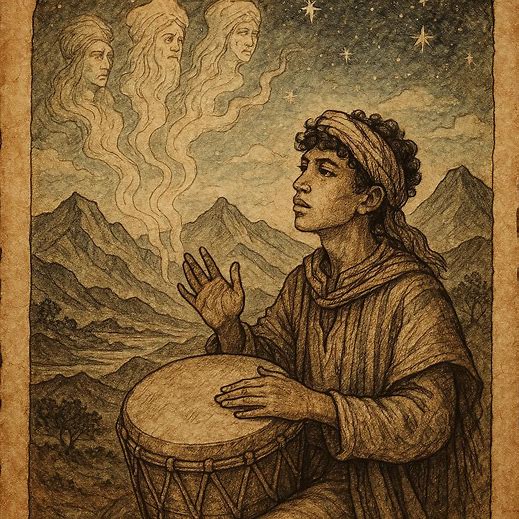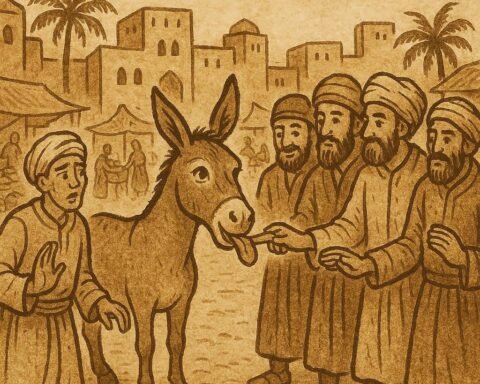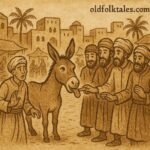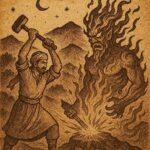Long ago, when the Rif Mountains were untouched by foreign hands and the villages nestled between their slopes still lived by the rhythm of their ancestors, the people believed that every stone, tree, and gust of wind carried a spirit. Among the most sacred of these spirits were the echoes that resounded whenever the great drums of the mountains were struck.
These were no ordinary drums. They were carved from cedar wood found deep in the mountain forest, stretched with goat hide cured under the full moon, and blessed with herbs gathered at dawn. The elders said that the drums could speak to the mountains themselves, carrying the voice of the people to the spirits who watched over them.
In one village, there lived a young boy named Yusef. His father was a shepherd, his mother a weaver, and though he was small, Yusef’s heart carried the curiosity of the mountains. Whenever the men beat the sacred drums during rituals, Yusef would creep to the gathering place and listen, wide-eyed, to the echoes rolling back from the cliffs. The beats never sounded the same twice. Sometimes they were soft like a lullaby, sometimes fierce like a lion’s roar.
“Why do the mountains answer us?” Yusef once asked his grandmother, a wise woman known for her stories.
She smiled, her wrinkled hands resting on her lap. “Because the mountains remember. When we drum, we awaken the voices of those who walked before us. The drums are not only for sound, Yusef they are for memory.”
The Silence of the Drums
One season, when the crops failed and the goats grew thin, the elders gathered. The drums were silent. Yusef noticed it immediately. Where once the rhythms carried across the valleys during planting and harvest, now there was only the whisper of wind.
“Why do they not drum?” Yusef asked again.
His grandmother’s eyes grew heavy. “The elders say the spirits are angry. They fear that drumming now will bring curses instead of blessings.”
But Yusef could not believe it. How could the drums that had carried prayers for generations suddenly turn against the people? At night, he dreamt of the drums beating alone in the forest, calling to him.
The Journey into the Mountain
One night, when the moon was high and silver, Yusef followed the sound in his dreams. He left his bed, crossed the quiet village, and walked toward the cliffs. There, deep in a cave, he found the old drums resting in silence. Dust lay thick on their hides, and the cedar frames creaked like tired bones.
As he reached out to touch them, a voice rose from the shadows of the cave.
“Why do you disturb our rest, child of the village?”
Yusef trembled but did not run. “Because the drums are silent, and without them the people are afraid. I want to know why the mountains no longer answer.”
From the darkness, a figure appeared. It was neither man nor beast, but a spirit with eyes that glowed like embers. Its form shifted like smoke, yet it carried the strength of stone.
“The drums are silent,” the spirit said, “because your people have forgotten their promises. The drums were not only for asking blessings. They were for giving thanks. Your people prayed for rain and food, but when the harvest came, they did not honor the mountains with gratitude.”
Yusef bowed his head. “Then let me drum. Let me thank the mountains, so they may forgive us.”
The spirit studied him, then nodded. “One drumbeat can awaken memory, but many drumbeats can awaken power. Go back to your people. Teach them again.”
The Return of the Echoes
The next morning, Yusef told the elders what he had seen. Some scoffed, saying he was just a boy with dreams. But his grandmother stood beside him. “The spirits speak to the pure of heart. We must listen.”
At dusk, the villagers gathered in the clearing. Yusef was given the smallest drum, and though his hands were young, his heart was strong. He struck the hide once, and the sound rolled out like thunder. It echoed back from the mountains, louder, clearer, alive. The people gasped.
Together, they began to drum, slowly at first, then faster, until the whole clearing trembled with rhythm. The echoes leapt from cliff to cliff, filling the valleys, rising to the stars. The mountains answered, not with anger, but with joy.
From that night onward, the drums of the Rif never fell silent again. The people learned to drum not only when they needed rain or strength, but also when they wished to give thanks, to remember, and to honor the spirits who lived in the stones.
And as for Yusef, he grew into a man whose hands never forgot the rhythm of that first echo. His name lived on in the mountains, carried by the drums that spoke to the spirits.
Moral Lesson
The folktale of The Drums of the Rif Mountains teaches that gratitude must walk hand in hand with prayer. To ask for blessings without giving thanks is to forget the bond between humans and the world around them. True harmony comes when we remember that the earth listens not only to our needs but also to our gratitude.
Knowledge Check
1. What is the central theme of The Drums of the Rif Mountains?
The central theme is the importance of gratitude and remembering ancestral traditions in maintaining harmony with nature and the spiritual world.
2. Why did the drums of the Rif Mountains fall silent in the story?
The drums fell silent because the villagers forgot to give thanks to the mountains and spirits after receiving blessings.
3. Who guided Yusef to understand the silence of the drums?
A mountain spirit revealed to Yusef that the people had neglected their promises of gratitude.
4. How did Yusef restore the connection with the mountain spirits?
Yusef played the drums with sincerity and taught the villagers to drum in gratitude as well as in prayer.
5. What role do the drums play in Riffian culture according to the tale?
The drums serve as a bridge between the people and the spirits of the Rif Mountains, carrying prayers, thanks, and memory.
6. What moral lesson does the folktale convey for modern readers?
It conveys that balance with nature and spiritual life requires both asking for help and offering gratitude for blessings received.






